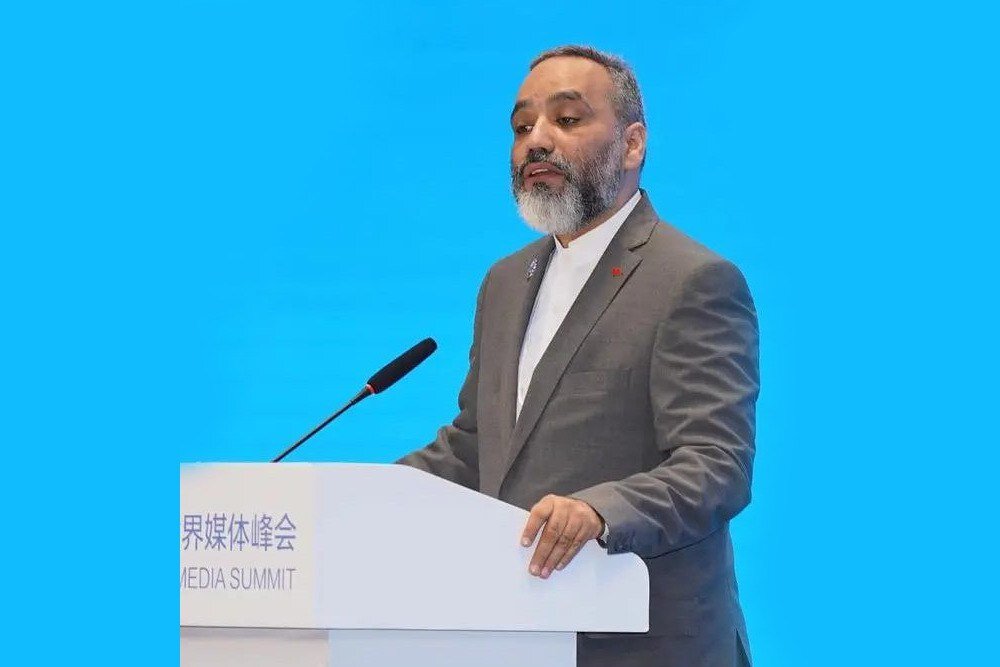Muzzling truth on social media, why and how?

TEHRAN- Recently, Meta took the step of blocking accounts associated with the Leader of the Islamic Revolution, citing repeated violations of the platform's rules as the reason behind this act. What has been less discussed is the absence of prior warnings from Meta to the account owners before the closure.
It is common for a media platform to establish and enforce rules while handling compliance with sensitivity. These rules should be transparent, accessible to all participants, and include a shared interpretation of the established laws between the platform and its users. Moreover, any potential deviations from these rules should be communicated to users, providing them with clear frameworks for policy-making and leveraging the platform's capabilities.
On the flip side, the more active a user is on a platform and the larger their follower count, the greater the necessity for mutual interaction in addressing emerging issues. Despite these expectations, the Instagram account of the Leader of the Islamic Revolution, boasting 5 million followers, was unexpectedly removed without prior warning.
Such actions might be tolerable from a newcomer in the media field without widespread influence. Still, Meta, overseeing several major media networks that currently dominate significant portions of social networks globally, should possess enough experience and expertise to avoid such abrupt measures.
But what might have triggered this unprofessional and rushed behavior? The primary challenge facing the United States and the Zionist regime today is the unjustifiable genocide unfolding in the Gaza Strip, with its scope expanding each day. Now in its fifth month, the war has devastated a significant portion of Gaza, yet the leaders of the Zionist regime show no signs of curbing this war crime. The heightened level of violence has sparked discontent and expressions of dismay even among Netanyahu's key allies and his extremist cabinet members. Joe Biden and Rishi Sunak have responded in their own ways to the indefensible actions of the Zionist regime.
But who is actually the main spokesperson for the people of Gaza and the resistance movement against these unjustifiable behaviors? Undoubtedly, the resistance has certain prominent figures whose words are recognized as sincere and explicit among both their proponents and opponents.
Ayatollah Khamenei has shown that by taking a clear and precise stance against the regime and the U.S., he has not only provided significant motivation for the resistance but also called effectively the inhumane foundations of Israel and its supporters into question.
It is not unusual when the Biden administration cannot stop Netanyahu and restrain him from the fruitless crimes he is committing, and has no justification for the public opinion worldwide resorts to suppressing the voices of dissent.
What emerges from Meta’s actions in shutting down Ayatollah Khamenei’s [social media] pages is that a will beyond the laws of this company has forced it to close such accounts, even in a society where liberalism and free market are supposed to be the central regulators of all relationships, and governments take pride in having minimal intervention in regulating these relationships.
Perhaps the government of the United States should be accountable for this behavior. A government that, although from the very beginning knew that responding to Hamas’ actions on October 7 is not only inhumane but also does not benefit the Zionist regime, has chosen to appear even more Zionist than Netanyahu himself.
There are a number of reasons behind the closure of the Leader's accounts; the first possibility is that the lobbies supporting the Zionist regime in America, which have a wide influence over the economy and politics of this country, have pressured Meta to close these pages. These pressures are unprecedented even for large American company owners. According to some experts, Elon Musk's sometimes contradictory behavior from the beginning of the Gaza war until now is due to such pressures, which have made him vacillate between what he believes in and what he is forced to commit to due to economic interests. If this is true, it means a violation of American sovereignty and the achievements that American democracy claims to have. This phenomenon is one of the concerns that always threatens the ideal model of liberalism. To regulate the political economy relations of American society, it is necessary for the United States government to respond proportionately, not because it has affected others; Rather, to preserve what has always been proud of as the achievements of democracy and the American Constitution.
It is also possible that the upcoming presidential elections or the need to maintain the economic supporters of the Biden administration and the Democratic Party have caused this behavior. In this case, what is clear is that today it has become so difficult for the U.S. government to justify domestic and international public opinion on the issue of the Gaza war that it will use all its tools to limit any voice that poses a threat to it.
But what is important in international communication is to pay attention to whether the laws and interests of the American government determine the boundaries of international communication. Thinkers who believe that the future of the world will be based on extensive social networks and virtual space, must answer the question of whether the United States has the right to limit any voice that opposes its goals and policies, even if it is right and benevolent. What kind of world will we face if the range of economic sanctions that are unfairly often imposed on opponents of American policies is also imposed on freedom of speech? If a phenomenon like Trump comes to power again and considers it an inalienable right to restrict freedom of expression based on his interests, how will he deal even with his allies? These are questions that should not be simply ignored as Metta's unprofessional behavior is revealed, which seems to have been dictated to it from above.
Mohammad Mahdi Rahmati is the Managing Director of the Tehran Times
